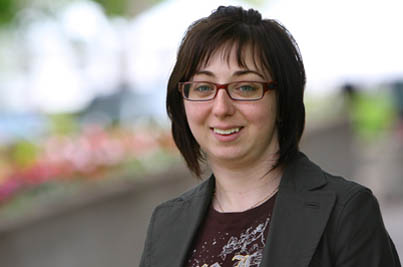Marie-Eve Veilleux: Overcoming adversity

Marie-Eve Veilleux came to McGill five years ago with a long list of concerns about coping with life as a disabled student. Today, she's a spokesperson and advocate helping other students with disabilities rise above adversity.
Owen Egan
Some people suffer from chronic lateness, others have punctuality down to a fine art. The latter know the exact time they need to leave the house to make it to class on time, or to get to the office at 8:59. It is mostly a question of being disciplined and organized.
Marie-Eve Veilleux knows all about getting organized. The 25-year-old Continuing Education student has to work out her comings and goings at least 24 hours in advance. Diagnosed with an exceptionally severe case of Juvenile Rheumatoid Arthritis when she was only 18 months old, Veilleux now needs special transportation to get to and around campus every day. With the disease attacking most of her joints, including her fingers, hands and even her jaw, she has great difficulty walking and is exhausted after attempting even short distances.
At age 12, Veilleux's knee and hip joints had deteriorated to the point where she could no longer even stand. They were replaced with prosthetic devices that allowed her to walk again, albeit it rather stiffly. After it became infected, her left knee prosthesis had to be removed to save the three others, so her left knee is locked and will not bend.
"I have to plan everything ahead of time," said Veilleux, a Montreal native and current resident of the Plateau Mont-Royal. "I like to avoid city buses because I have to carry my things and it is not good for my joints. But to take the city's adapted transport services you have to call 24 hours ahead. If I need to be somewhere at 2, I tell them 1:45 just to be safe. You never know what can happen," she said.
Despite the challenges posed by her mobility problems, Veilleux has managed to do more than just make it to class. One year after she was awarded a BSc in Microbiology and Immunology, Veilleux received a Certificate in Translation during the recent Continuing Education Convocation ceremonies. But she couldn't have done it, she said, without the help of McGill's Office for Students with Disabilities (OSD).
Getting help, helping others
Before starting her undergraduate program five years ago, Veilleux visited the OSD with a list of her concerns. It was a long one.
"I was freaking out…a new school, a new language, on top of everything else," Veilleux said.
The OSD went through each of the concerns with her, including how to use McGill's free adapted transportation system. The University's adapted van transports registered users between any of the University's downtown buildings. Over the years, the OSD has occasionally moved Veilleux's classes from buildings that could not accommodate her needs, which sometimes include a wheelchair. Because she can only write for a few minutes at a time, the OSD has even supplied her with note-takers.
"The OSD is amazing, and my professors have been, too," Veilleux said. "In science I was very surprised. I had to explain that my disability didn't allow me to do lab work. But they were very open-minded about it and we worked it out."
Not everything has been so easily overcome, though, like battles with the provincial government's Aide financière aux ètudes office over her eligibility for adapted transport, or fighting for access to scholarships closed to part-time students.
"McGill has a policy of recognizing part-time disabled students as full-time ones," Veilleux said. "But many scholarship programs still don't accept applications from part-time students, and that is going to be my battle this summer, to have them understand that being part-time is not a choice for some people, like me. It's because I don't have the energy. Scholarships that are open to everyone should include everyone," she said.
So complete is Veilleux's knowledge of the OSD and disabled students' rights that she has started attending conferences on the subject and speaking at OSD events. During Equity Week last fall, she addressed a group that included a number of professors, explaining the difficulties some students with disabilities commonly face.
Veilleux is also a spokesperson for the Arthritis Society, which she represents at conferences and other events. As well as performing weekly office duties, she also takes part in various campaigns. Veilleux is currently training for the 10-km walk portion of the next Montreal Marathon as part of the Society's Joints in Motion program.
"I hope to walk 4 or 5 km," she said. "I'm already up to 2." Veilleux will be back at McGill next fall to pursue a graduate diploma in translation, after which she hopes to earn a master's degree in epidemiology "to learn more about my disease."
For more information about McGill's Office for Students with Disabilities and the services they offer, visit www.mcgill.ca/osd.
Search
Search (skip):
"My battle this summer: to have others understand that being part-time is not a choice for some people."Marie-Eve Veilleux

